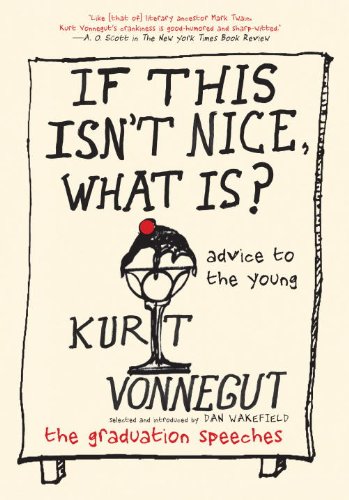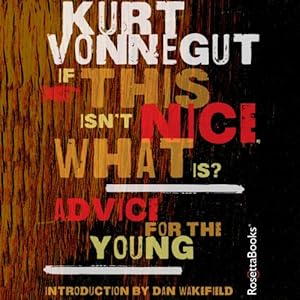
![]() If This Isn’t Nice, What Is?: Advice to the Young by Kurt Vonnegut
If This Isn’t Nice, What Is?: Advice to the Young by Kurt Vonnegut
If This Isn’t Nice, What Is?: Advice to the Young collects nine graduation speeches delivered by Kurt Vonnegut. Published in 2013, this posthumous collection is introduced by the writer Dan Wakefield. The earliest speech was delivered in 1978, while the latest was given in 2004.
These speeches are almost exactly what Vonnegut’s fans would expect of him — so much so that I wish I’d attempted to write a speech from the point of view of Kurt Vonnegut before beginning this book. The speeches feature his darkly humorous assessment of the human condition, as well as his deeply felt esteem for mercy, compassion, and contributing in spite of it all to make the world a slightly better place. He is also happy to poke fun at himself, though I enjoyed this opener from “How to Make Money and Find Love!”
Perhaps you’ve read the novel Childhood’s End by Arthur C. Clarke, one of the few masterpieces in the field of science fiction. All of the others were written by me.
(Well, I laughed.) Although I didn’t constantly count sentences, the longest paragraph I noticed had three sentences.
The speeches somewhat vary in their subject matter, but there are recurring themes. Most of them encourage students to appreciate those who have helped them along the way and he often pauses to invite listeners to identify a teacher who played a positive role in their life. Vonnegut often stops to identify the graduation as a puberty ceremony. His analyses rarely surprise. In fact, I was only struck by his argument that marriages often end because a partner is not enough to satisfy all of life’s needs. It takes a family and a community. By the 2000s, his speeches criticize conservatives during the Bush era, particularly for the invasions of Iraq and Afghanistan but he also seems to find hypocrisy in right-wing Christians. (Bush supporters should note that these digressions are a short part of a short book; Bush detractors can turn to Vonnegut’s A Man Without a Country for a more thorough account of the author’s views.) He often praises the teachings of Christ, though he does so in order to emphasize Christ’s compassionate influence on humanists. He particularly likes the Sermon on the Mount and wonders why people rarely ask for it, as opposed to the Ten Commandments, to be posted in public places. At one point, he wonders what would happen if “blessed are the merciful” were written in a court room.
Are these speeches fun to read? To be honest, there’s more overlap than one might expect in speeches that were given over nearly 30 years. It’s not that the speeches are the same, so much as there are certain moments that Vonnegut returns to, such as the story of his uncle who encouraged people to stop and ask, “If this isn’t nice, what is?” Still, there is enough overlap that I was surprised to learn that a second, expanded, edition of this book was released. Then again, graduation speeches tend to overlap in their advice, or at least in their tone. And, having sat through a number of graduation speeches, these ones seem like they would have been excellent, even on a hot June day. They are short, funny, and leave the audience with a warm reminder that much of life consists of being kind. In fact, if anyone reading this review has the misfortune to have been assigned a graduation speech this coming spring, these speeches may be a source of inspiration.
All told, If This Isn’t Nice, What Is? is short, often funny, and sometimes moving, perhaps especially because one feels somehow connected to Vonnegut while reading these speeches.
~Ryan Skardal
![]() I listened to the audio version of If This Isn’t Nice, What Is? and, like Ryan, enjoyed Vonnegut’s speeches and the feeling of connection to a writer, humorist, and human that I admire.
I listened to the audio version of If This Isn’t Nice, What Is? and, like Ryan, enjoyed Vonnegut’s speeches and the feeling of connection to a writer, humorist, and human that I admire.
~Kat Hooper




I agree with Kat — listening to these speeches and actually hearing the author perform his words seems like the best way to experience them.
And Ryan, I laughed, too, so you’re not alone!
Thanks for the review! I’ll check them out. I love a good graduation speech (seriously). David Foster Wallace’s is one of my favorites: This Is Water.